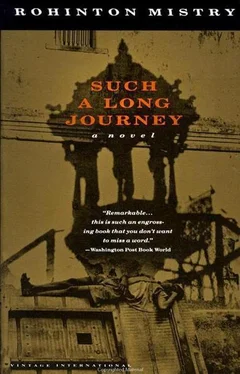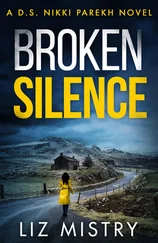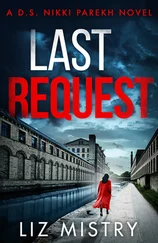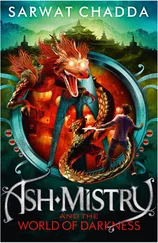At the Tower, the chief nassasaler clapped three times: the signal to start the prayer for Dinshawji’s ascending soul.
While they prayed, the vultures descended in great numbers, so graceful in flight but transforming into black hunched forms upon perching, grim and silent. The high stone wall was lined with them now, their serpent-like necks and bald heads rising incongruously from their plumage.
The prayer books were handed back, the white handkerchiefs folded and put away. The mourners had to make one last stop: to wash their hands and faces, do their kustis, before returning down the hill to rejoin the world of the living. And there, amid the sound of water taps and the murmur of prayers, Gustad turned abruptly to Mr. Madon: ‘I need leave on Friday and Saturday.’ It was wholly impulsive; he had prepared no excuses.
But Mr. Madon assumed the request was relating to Dinshawji’s death ceremonies. He was quite understanding: ‘Of course. I will mark it on my calendar, first thing in the morning.’
At the bungalee, Gustad returned Nusli to Alamai. She thanked Mr. Madon for coming. He replied it was his duty.
The street lights were extinguished as Gustad’s taxi arrived at Victoria Terminus. The white statue of the Queen hovered in the dawn before the main facade. Red-shirted porters with thick, head-cushioning turbans rushed to the taxi, turning away disappointed when they saw the small bag.
Gustad went to the huge display but no trains were listed. Nearby, the questions of hordes of disgruntled travellers were being fielded by a white-jacketed official who kept removing his black-visored white cap to rub his forehead. Gustad waited for an opening, a space to elbow himself into, and finally shouted over their heads, ‘Please excuse me, Inspector!’
His words found a direct channel to the beleaguered ears. The ‘please’ was balm to that harried spirit: ‘Yes sir.’
‘Where are all the trains?’
‘Railway is gone on strike since midnight, sir.’
Gustad felt relief: now I can cancel the trip with a clear conscience. ‘There is no service at all?’
‘We don’t know that, sir. But please listen to loudspeakers, they will be providing all the latest news.’
Gustad thanked him and went to the Inquiry counter. A handwritten sign perched on the closed window: refunds were available, but all bookings would be honoured when service resumed. To return his ticket, give back the money to Ghulam Mohammed, would be the easiest thing. Forget Jimmy once and for all. But if I don’t give him a chance. To explain…
The tea stall was doing brisk business. Dilnavaz had forbidden Gustad to consume anything not packaged by a reputable company, but it was too early for a bottled cold drink. The man was setting up a pyramid of cups and saucers: ‘Hot chai! Hot chai!’ At intervals he eschewed that prosaic call for a rhyme sung with great gusto:
Drink from saucer, drink from cup!
Forget your sorrow, drink it up!
Train will run — today? tomorrow?
Drink one saucer, forget your sorrow!
Gustad set down his bag and ordered. ‘Wait!’ he exclaimed as the man was about to pour from a vast kettle boiling atop a Primus stove at full blast. ‘That cup is dirty.’
The man squinted into it: ‘You are absolutely telling the truth. But why worry, in one second it will be clean.’ Without warning he cuffed his helper violently over the ear. ‘ Budmaas ! Leaving it dirty? Wash properly or I’ll throw you out!’
‘The water only is dirty, what can I do, you won’t let me get more,’ mumbled the boy of eight or nine, dipping the cup in a bucket of murky water.
He was cuffed over the other ear for his efforts. ‘ Sooverka batcha ! Blaming the water? Wash! Wash properly or every huddi I will break.’ He smiled ingratiatingly at Gustad while the child whisked the cup around in the brown fluid: ‘Absolutely clean now,’ then dried it with a flourish of the cloth doing triple duty: to wipe brow, counter, and crockery.
Gustad took the tea and moved away. He poured a little in the saucer, blew, and tried a draught. The scalding brew was strong and sweet. Felt good going down, despite the dirty cup. Ah, the unique pleasures of railway tea: not so much the drink but the act, the privileged observer status it conferred. He watched detachedly as a family of four made itself comfortable under the station clock. Bedding unrolled, the father was fast asleep, outmanoeuvring circumstances that laid waste to his plans. Wife by his feet, infant at her breast. An older child curled up beside his father. Around their temporary shelter stood walls of luggage. Not far away, a woman lit her portable kerosene stove to make chapaati. Her family members ate a pungent breakfast stew from shiny stainless-steel boxes.
A railway security person approached the stove, bent over wordlessly and doused the flame. ‘Oiee!’ cried the woman. ‘What are you doing?’ Maintaining his arrogant silence, he pointed to the sign listing prohibited acts.
‘I’m a poor person,’ said the woman. ‘How can I read?’
The guard deigned to speak, reading the law for her. ‘What kind of law is this?’ protested the woman. ‘Not being allowed to make chapaati for my children?’
‘For the sake of your children’s chapaati if whole place catches fire, then what?’
The loudspeakers came alive with violent hissing and crackling, then a high-pitched hum. A hush descended upon the railway station. The tea-stall clatter ceased; the newsstand boys stopped calling; and the sudden quiet awakened the man on the bedding. He sat up with a start. Everyone waited for the voice from above to speak of deliverance. The hiss and crackle bore fruit: ‘Checking checking checking. One two three four. Checking. Ek do teen chaar. ’ A painful whine. Then the voice again, hoarse and indistinct, the malfunctioning system devouring most of the words. The survivors emerged like grape seeds spat carelessly through the loudspeaker mesh: ‘Passengers are req…to vacate the plat…and wait in the…trains arrive…at which time…ssengers with tickets may…platforms.’
A small trickle relinquished the platforms; most stayed put with their luggage. Railway security guards were dispatched to herd them out. Rifle-bearing soldiers patrolled the yards, examining the tracks and signal boxes.
Gustad returned his empty cup to the counter and bought a newspaper. The headlines were about the strike; the Minister for Railways promised that essential services would be maintained by managerial staff and the army.
That means a Bombay-Delhi train will certainly run, thought Gustad. He lost himself in the paper, the first he had purchased since the quarrel with the dogwalla idiot, when the carefully balanced household budget had gone up in smoke.
There was an announcement: Platform seven now boarding — unreserved train leaving for New Delhi.
Gustad folded his newspaper and hurried to the bottleneck at the platform seven entrance. With his one small bag he had an advantage over families with trunks, beddings, stoves, cooking utensils, cradles, wooden crates, and fragile earthen pots of drinking water. The train was not yet at the platform. Red-shirted coolies were busy circulating among the crowds. ‘Risvard! Risvard seat! Ten rupees risvard!’ One of them approached Gustad. ‘Yes sahab, risvard seat?’
‘This is not a reserved train,’ said Gustad.
‘Yes, yes, but I will find you risvard seat. You pay ten rupees only if you are happy,’ said the coolie.
Gustad looked around him, and saw crowds thick enough to fill five trains. ‘OK,’ he said. The coolie led him down the platform and gave him a place to wait.
Читать дальше












